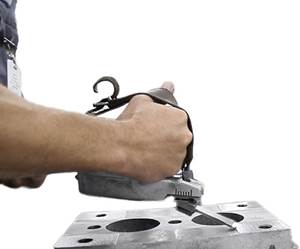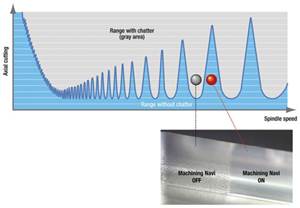Waukesha School Influences Winners
Within the past four years, three Waukesha tech school graduates have won the coveted NTMA apprenticeship award - quite a testament to the school's curriculum and faculty.
As the popular saying goes, there must be something in the water at Waukesha County Technical College (WCTC) - located just on the outskirts of Milwaukee, WI. Three out of the past four years, graduates from its program have won the National Tooling & Machining Association (Fort Washington, MD) Annual Apprentice Competition - quite an accomplishment for a small county school that recently revamped its program (see MoldMaking Technology magazine, November 1999, page 61).
Winning the competition is no easy task. First, each winner had to win the regional competition. This involved being employed as an apprentice by a company that is a member in good standing of the NTMA. During the fourth year of their apprenticeships, they competed with other apprentices in a one-day competition at WCTC - held at the Milwaukee chapter each December.
Included in the competition is a milling and turning project that they must try to complete in a given amount of time - and they are scored on the precision measurements of the parts and the time it took to complete. They also have to take a written test that includes math problems. Everyone in the entire nation is given the same test and parts to complete. The winner of the local contest is then sent on to compete at the nationals, which are held in a different state each year during the spring. So, it is the best apprentice from each chapter in the NTMA that is competing in the nationals.
While WCTC cannot take full credit for its graduates' victories, their educational background obviously played a big part in their performance. According to moldmaking instructor Bob Novak, "We're happy and proud of it, but by no means can we take all of the credit. We have a really good team of instructors here and a great curriculum, but the ultimate credit goes to each apprentice and the companies they work for - especially the journeymen who have worked with them for the three or four years before they were eligible for the competition."
Novak believes that the strongest part of WCTC's curriculum is the fact that the instructors went back to the basics. "It was easy to get way out there with technology, but the fact of the matter is that students are going to start at entry level," Novak states. "We don't want to ignore the technology, but we also really emphasize basics like square up a block, tram a block in, machine something to size and understand tolerances on a print."
Winners' Circle
1998: Jeff Kramer, Stanek Tool (New Berlin, WI).
Kramer has been with Stanek Tool for six years, and his primary responsibilities include building and troubleshooting workholding fixtures. He was thrilled to win the award, and acknowledges the role WCTC played in his win and his success at Stanek. "If an individual is going to take the time and effort to make it a priority to learn, he can take what the school has to offer and convert it into something beneficial for him in the real world," Kramer says. "I feel that getting an early start is definitely something that benefited me. Having a good mathematical background also is important. I do talk to high school students from time to time and I stress to them to take as much math as they can because it's not going to hurt them and it's free in high school! I also suggest taking tours of companies."
Kramer also is quick to credit his coworkers. "When I came into the trade I was 20 years old and I had people twice my age teaching me," he states. "It took a lot for them to teach me because they could have looked at it as I could take their job someday. But that's not the way people in this shop are - everyone is willing to help each other out if you have a positive attitude. Without them, I would have never won any contest!"
His future plans include getting involved with prototypes in the automotive industry, including testing and researching new technologies.
2000: Wally Haluska, Mahuta Tool (Germantown, WI).
This toolmaker has been with Mahuta Tool for six years and is involved in planning jobs, running the machines, assembly, proving out the tools and production machining. When he won the award, he was "overwhelmed and surprised" - receiving many job offers as well as coverage in the local newspapers. "It was neat, like being a mini-celebrity," he says.
WCTC taught him basic theory and refreshed his math from high school. He feels strongly about pursuing his education and plans to return to school within a year to take some management courses and perhaps pursue some design work. "I just want to keep learning and sharpen the skills that I already possess," Haluska notes. "If I'm not learning, I'm not having fun. That's what makes my day so fast - the challenges that I face each day and keeping busy. Doing the same thing day in and day out is of no use to me. Hopefully, someday when I'm 40, I'll have my own business.
"You have to set your goals high so you get somewhere in life," he adds. "It's an interesting trade dealing closely with new technology; it's never-ending learning!"
2001: Dan Jorgensen, Omega Tool (Menomonee Falls, WI).
Also a toolmaker by trade, Jorgensen has been with Omega for five years now. "I was very surprised to have won the award," Jorgenson says. "The two-day competition was really draining and by the time you got through the two days, nobody thought about who was going to win. It was a lot of fun though."
Jorgensen extends credit to WCTC - and his coworkers - for teaching him so much about the trade. "I am really impressed with the college - it has a well-rounded curriculum," Jorgensen says. "The math courses are especially good; there was one instructor, Richard Salmon, who set up his math classes parallel to the math that you end up using in the shop. All of his trig problems were based on actual shop situations. It was a great background for my apprenticeship."
Jorgensen wants to get into design someday, but is in no big rush. "I don't want to do anything different until I get sick of doing what I do now, which I don't see happening for a very long time," he states. "The technology changes fast enough where things stay interesting - it doesn't stagnate so you are doing the same thing day in and day out."
One thing is certain: in an ever-changing industry there cannot be enough emphasis placed on obtaining a quality education and having a first-rate apprenticeship program to "mold" our future moldmakers and ensure the longevity of the industry. Clearly the results speak for themselves!
Related Content
Hands-on Workshop Teaches Mold Maintenance Process
Intensive workshop teaches the process of mold maintenance to help put an end to the firefighting culture of many toolrooms.
Read MoreThe Benefits of Hand Scraping
Accuracy and flatness are two benefits of hand scraping that help improve machine loop stiffness, workpiece surface finish and component geometry.
Read MoreHow to Eliminate Chatter
Here are techniques commonly used to combat chatter and guidelines to establish a foundation for optimizing the moldmaking process.
Read MoreHow to Determine the Proper Vent Depth
Vent depth is critical to optimizing mold performance, so here is one approach to finding that elusive right number.
Read MoreRead Next
How to Use Continuing Education to Remain Competitive in Moldmaking
Continued training helps moldmakers make tooling decisions and properly use the latest cutting tool to efficiently machine high-quality molds.
Read MoreHow to Use Strategic Planning Tools, Data to Manage the Human Side of Business
Q&A with Marion Wells, MMT EAB member and founder of Human Asset Management.
Read MoreAre You a Moldmaker Considering 3D Printing? Consider the 3D Printing Workshop at NPE2024
Presentations will cover 3D printing for mold tooling, material innovation, product development, bridge production and full-scale, high-volume additive manufacturing.
Read More












.jpg;maxWidth=300;quality=90)













